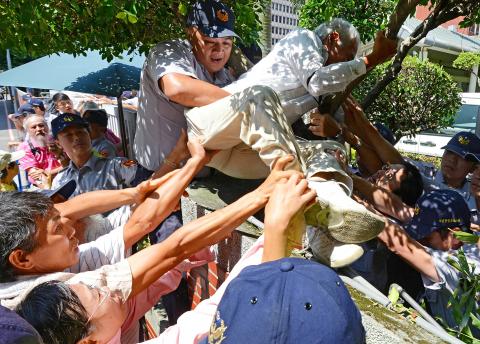A public opinion poll released yesterday showed that most people support fair trade and cross-strait trade liberalization, but lack confidence in the capability of President Ma Ying-jeou’s (馬英九) administration to safeguard Taiwanese interests in its engagement with China.
The survey, conducted by Taiwan Indicators Survey Research (TISR), asked respondents about their views on a recently signed service trade pact between Taiwan and China. It found that 58.7 of respondents supported Taiwan’s pursuit of economic partnership agreements in general; only 16.5 percent did not support the move and 24.8 percent declined to answer.
However, opinions were divided on cross-strait economic relations, with 43.3 percent of respondents saying they believed Ma’s push for cross-strait trade liberalization would improve Taiwan’s competitiveness, while 34.3 percent said the president’s policy would increase the nation’s economic dependence on China.

Photo: Sam Yeh, AFP
The survey also found that 42.7 percent of respondents thought the service trade agreement was unnecessary — almost 10 percentage points higher than the 32.6 percent who supported the pact — while 24.7 percent said they had no opinion.
A further breakdown of the poll data showed how opinions were divided along political lines, with 57.9 percent of pan-blue supporters favoring the pact and 72.5 percent of pan-green supporters opposing the deal.
Opinions among those who identified themselves as independent voters were more balanced: 40.4 percent disapproved of the pact, against 27.2 percent who supported it.
Public confidence in the Ma administration’s ability was also low, with 62.3 percent of respondents saying they did not believe the government would be able to reduce the adverse impact of opening the domestic market to China and to safeguard local industries’ interests. Only 21.6 percent of respondents expressed their confidence in the government, while 16.1 percent gave no answer.
According to TISR, the percentage of respondents who said they were confident about the Ma administration’s capability to deal with the impact of cross-strait trade liberalization dropped by 9.1 percentage points compared with a poll conducted in 2009, when Taipei began negotiations with Beijing over the Economic Cooperation Framework Agreement (ECFA).
At the same time, the number of people who were doubtful of the government’s capability to deal with the issue increased by 13.1 percentage points, TISR said in a press release.
The survey also found that Premier Jiang Yi-huah’s (江宜樺) approval rating of 17.7 percent was the lowest since he assumed the post in February, while Ma’s disapproval rating remained dismal at 70.7 percent.
The survey, conducted from July 24 to 26, collected 1,008 valid samples and had a margin of error of 3.1 percentage points.

Tropical Storm Gaemi strengthened into a typhoon at 2pm yesterday, and could make landfall in Yilan County tomorrow, the Central Weather Administration (CWA) said yesterday. The agency was scheduled to issue a sea warning at 11:30pm yesterday, and could issue a land warning later today. Gaemi was moving north-northwest at 4kph, carrying maximum sustained winds near its center of up to 118.8kph and gusts of 154.8kph. The circumference is forecast to reach eastern Taiwan tomorrow morning, with the center making landfall in Yilan County later that night before departing from the north coast, CWA weather forecaster Kuan Shin-ping (官欣平) said yesterday. Uncertainty remains and

SEA WARNING LIKELY: The storm, named Gaemi, could become a moderate typhoon on Wednesday or Thursday, with the Taipei City Government preparing for flooding A tropical depression east of the Philippines developed into a tropical storm named Gaemi at 2pm yesterday, and was moving toward eastern Taiwan, the Central Weather Administration (CWA) said. Gaemi could begin to affect Taiwan proper on Tuesday, lasting until Friday, and could develop into a moderate typhoon on Wednesday or Thursday, it said. A sea warning for Gaemi could be issued as early as Tuesday morning, it added. Gaemi, the third tropical storm in the Pacific Ocean this typhoon season, is projected to begin moving northwest today, and be closest to Taiwan on Wednesday or Thursday, the agency said. Today, there would likely

DISRUPTIONS: The high-speed rail is to operate as normal, while several airlines either canceled flights or announced early departures or late arrivals Schools and offices in 15 cities and counties are to be closed today due to Typhoon Gaemi, local governments announced last night. The 15 are: Taipei, New Taipei City, Taoyuan, Tainan, Keelung, Hsinchu and Kaohsiung, as well as Yilan, Hualien, Hsinchu, Miaoli, Chiayi, Pingtung, Penghu and Lienchiang counties. People should brace for torrential rainfall brought by the storm, with its center forecast to make landfall on the east coast between tonight and tomorrow morning, the Central Weather Administration (CWA) said. The agency issued a sea warning for the typhoon at 11:30pm on Monday, followed by a land warning at 11:30am yesterday. As of

CASUALTY: A 70-year-old woman was killed by a falling tree in Kaohsiung as the premier warned all government agencies to remain on high alert for the next 24 hours Schools and offices nationwide are to be closed for a second day today as Typhoon Gaemi crosses over the nation, bringing torrential rain and whipping winds. Gaemi was forecast to make landfall late last night. From Tuesday night, its outer band brought substantial rainfall and strong winds to the nation. As of 6:15pm last night, the typhoon’s center was 20km southeast of Hualien County, Central Weather Administration (CWA) data showed. It was moving at 19kph and had a radius of 250km. As of 3pm yesterday, one woman had died, while 58 people were injured, the Central Emergency Operation Center said. The 70-year-old